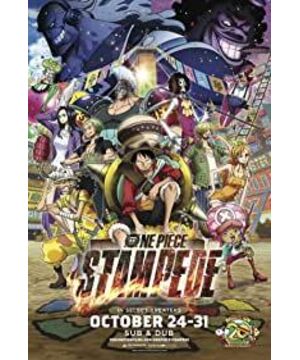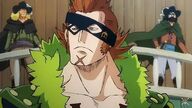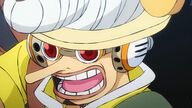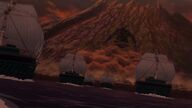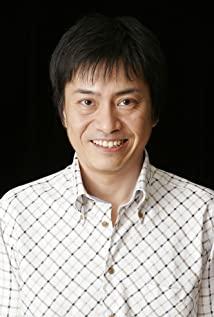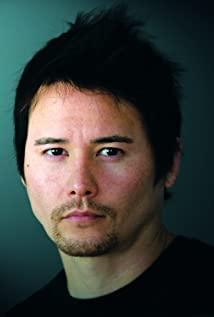The truth is the ending, that is the moment when Luffy discovered the one piece and became the Pirate King.
According to the analysis of the friends who went with him, Luffy said in the movie "There is no way to have a party without Usopp" is not a blunt line. It was predicted before that the pirates would end with a big banquet, look at Luffy, he will always eat and drink at the party after defeating the big boss (win Crocodile, Fisherman's Island, Dresses in the desert) Rosa et al.
This foreshadowing and the eternal compass pointing directly to one piece in the movie are the two plot settings that make me feel the closest to the end. After reading it today (yesterday to be precise), I suddenly wanted to analyze our most dazzling and individual protagonist Luffy and the frame construction of the movie. Some people in the comment area felt that "the movie has lost its soul when the whole scene is over." But I don't think so. Pirate has never let me down, its soul is in Luffy's eyes when he fights.
1. Luffy's Rebellion and Loyalty to Self
Luffy is constantly getting stronger and growing with his partners. Luffy's charisma is for sure. In the past, my thinking was that because of his strength, coupled with his unconditional trust in his partners and his help in anything he thought was injustice, he gained a group of followers all over the world and could help him. The big man, these precious qualities together constitute his aura of protagonist.
At the end of "Fever Action", Oda, with the help of the villain, finally said that the world's affirmation of Luffy "can unite partners and enemies, this is the quality of being a pirate king". I suddenly realized that what moved and fascinated me most about Luffy was his rebellion and his extreme loyalty to himself.
When pirates, burn and loot, and go against the rules of the world government and the justice they follow, is this rebellion? It looks like it is, but in essence I prefer to call it "pseudo-rebellion". What is a pseudo-rebellion? The challengers of the rules are gradually disciplined and become the makers of new rules and the starting point for the challenges of the new generation of rebels. Shichibukai's cooperation with the World Government is an example. And Luffy's rebellion is completely different from this. He is actually against the rules of survival in the adult world, not only against the rules, but also against the making of rules. He won't take over like many pirates, and he won't build an island of his own and make a set of rules on the island. He also doesn't think about strategies like alliances because he faces a common enemy, he simply wants to defeat him.
Those moments of blood that can ignite the flames in our hearts are the moments of Luffy's fearlessness and rebellion: on the Judiciary Island, Luffy let Usopp shoot through the flying government flag; on the Chambord Islands, Luffy stabbed it hard. Taking a few steps forward, he punched the Tianlongren in the face. In my opinion, this moment is more meaningful than Luffy simply defeating a strong opponent.
Strictly speaking, extreme loyalty to oneself is also a manifestation of rebellion. Because being true to oneself means a strong resistance to external constraints. Dreams and partners, things that have been discarded when the adult world is seriously moving forward, are the two factors that Luffy values most.
Luffy did not hesitate to crush the eternal compass pointing to the one piece, because he completely obeyed his own pursuit of freedom. And freedom is his eternal dream. The freedom he wants is absolute freedom both physically and mentally. On the Chambord Archipelago, Usopp asked Reilly for one piece, Luffy stopped Reilly from answering with a long "Uso~P"; The compass, which is not easy to walk, was once again destroyed by Luffy. It can be seen that Luffy is a person who emphasizes the process and ignores the result. He rejects shortcuts and believes that any kind of challenge is growth and a valuable adventure to experience with partners. Regardless of the cost, not afraid of losing, and the type of personal inner driving force is the spiritual freedom that modern people yearn for.
2. Take shortcuts, or are you still strong?
Roger threw the compass into the sea and Luffy crushed the compass.
Known as the strongest player in the world, Bartley did everything to win the compass, and he thought that with this, he could surpass Roger. The Navy and CP0 want to take back the compass, they believe that as long as it doesn't fall into the hands of pirates, they can go one step further in achieving justice. But the compass was easily destroyed by Luffy.
So what exactly does a compass stand for?
For pirates, it is a shortcut used to prove their power in the world of the strong. In front of the road of victory and success, there is a fast through car that can avoid many obstacles and dangers.
For the Navy, it's a ticking time bomb that heralds another world chaos. Once you have it, you can demonstrate the authority of the government.
And destroying it is out of a powerful self-confidence. Because you don't need shortcuts or power, you can reach the other side you want to go.
So how powerful is Bartley? He can shatter an island, but he can never beat Roger. The weakness in his heart is that he can never find himself. He regarded Roger as a competition object, but the attitude Roger showed after winning was not a competition, but more like an easy battle for the next exchange of force after a competition. Roger seems to be out of the world, but he has all the prestige. Maybe at that moment, he realized that he could not surpass Roger no matter what, and he also realized that his constant search for constant proof was actually self-lost.
When a gloomy behemoth waved his arms angrily on the isolated island, even if the fortified boat and cannon surrounding it were as small as a fish scale, I still felt that it was a trapped beast, and his resistance was a kind of sadness.
3. Overtaking Roger for "becoming the most famous rave organizer"?
Buena Festa and Barrett teamed up with a common goal of surpassing Roger. Barrett is to prove that he is stronger than Roger by force, and Festa wants to end the pirate era opened by Roger by supporting Barrett to become the new "world's strongest" and hold the world's largest carnival celebration. The biggest celebration is the creation of a new era.
"Force is also a carnival."
The sea is the battlefield. All-powerful pirates who evolve and upgrade for one piece aim to become the pirate king. The new One Piece will replace Roger as the One Piece and start his own era. Boldly predict that at that time, the strong men from all over the world will challenge him, because defeating him will become the next new One Piece recognized by the world. This kind of change between the old and the new era is based on the value of force. This is also the pirate world we first knew.
In this way, Festa's perspective on becoming the leader of the era is very clever. Because he did not prove that he was the strongest in force, and he didn't have to suffer physical pain, the world became "Festa's age of force" instead of "Gore D. Roger's age of sailing". In his day, he and Barrett held the supreme power, and in his eyes the government could not restrain them. Pirates will make two choices for the eternal compass: oppose him, or surrender to them. This is his ideal world.
But he lost in the end. Because he took advantage of the black market, the navy, pirates, and even Barrett. He takes advantage of everyone and wants to get the results he wants. He still doesn't understand what is "the strongest" and what qualities can stand on the bow of the times.
Every era is an orgy where a group of people jump for power.
View more about One Piece: Stampede reviews


